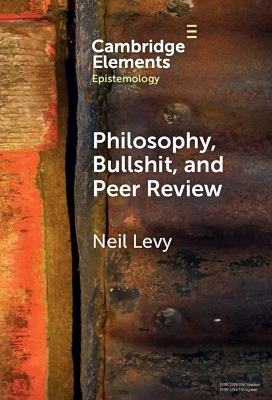
Philosophy, Bullshit, and Peer Review
Seiten
2024
Cambridge University Press (Verlag)
978-1-009-46231-0 (ISBN)
Cambridge University Press (Verlag)
978-1-009-46231-0 (ISBN)
This Element examines some of the concerns on peer review that it no longer is fit to ensure that published work meets high standards of rigor and interest. It uses evidence that critics of peer review sometimes cite to show its failures. This title is also available as Open Access on Cambridge Core.
Peer review is supposed to ensure that published work, in philosophy and in other disciplines, meets high standards of rigor and interest. But many people fear that it no longer is fit to play this role. This Element examines some of their concerns. It uses evidence that critics of peer review sometimes cite to show its failures, as well as empirical literature on the reception of bullshit, to advance positive claims about how the assessment of scholarly work is appropriately influenced by features of the context in which it appears: for example, by readers' knowledge of authorship or of publication venue. Reader attitude makes an appropriate and sometimes decisive difference to perceptions of argument quality. This Element finishes by considering the difference that author attitudes to their own arguments can appropriately make to their reception. This title is also available as Open Access on Cambridge Core.
Peer review is supposed to ensure that published work, in philosophy and in other disciplines, meets high standards of rigor and interest. But many people fear that it no longer is fit to play this role. This Element examines some of their concerns. It uses evidence that critics of peer review sometimes cite to show its failures, as well as empirical literature on the reception of bullshit, to advance positive claims about how the assessment of scholarly work is appropriately influenced by features of the context in which it appears: for example, by readers' knowledge of authorship or of publication venue. Reader attitude makes an appropriate and sometimes decisive difference to perceptions of argument quality. This Element finishes by considering the difference that author attitudes to their own arguments can appropriately make to their reception. This title is also available as Open Access on Cambridge Core.
Introduction; 1. Bullshit philosophy; 2. Intellectual charity in everyday (Academic) life; 3. Too much trust? The lesson of hoaxes; 4. Publication requires commitment; 5. In Lieu of a conclusion; References.
| Erscheinungsdatum | 09.01.2024 |
|---|---|
| Reihe/Serie | Elements in Epistemology |
| Zusatzinfo | Worked examples or Exercises |
| Verlagsort | Cambridge |
| Sprache | englisch |
| Maße | 158 x 235 mm |
| Gewicht | 260 g |
| Themenwelt | Geisteswissenschaften ► Philosophie ► Erkenntnistheorie / Wissenschaftstheorie |
| ISBN-10 | 1-009-46231-8 / 1009462318 |
| ISBN-13 | 978-1-009-46231-0 / 9781009462310 |
| Zustand | Neuware |
| Haben Sie eine Frage zum Produkt? |
Mehr entdecken
aus dem Bereich
aus dem Bereich
die Grundlegung der modernen Philosophie
Buch | Softcover (2023)
C.H.Beck (Verlag)
CHF 25,20
Buch | Softcover (2023)
Reclam, Philipp (Verlag)
CHF 9,80


![Was heißt Denken?. Vorlesung Wintersemester 1951/52. [Was bedeutet das alles?] - Martin Heidegger](/media/113619842)